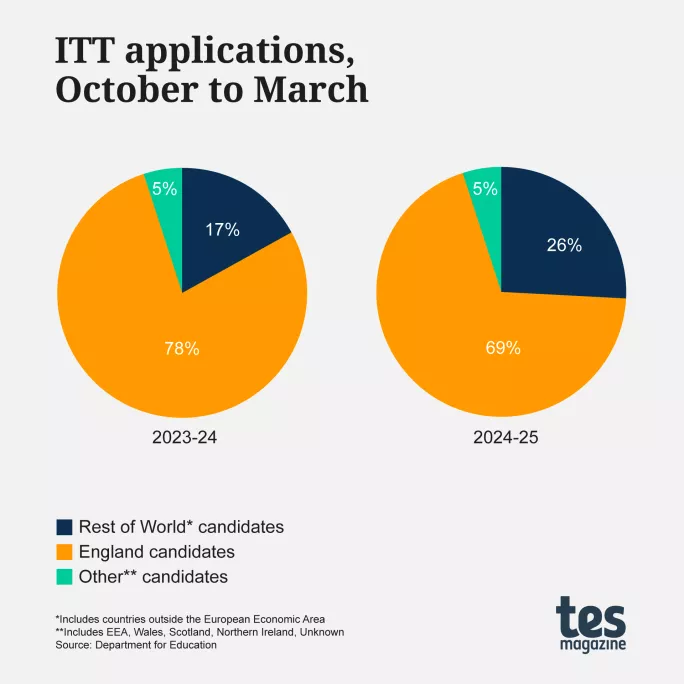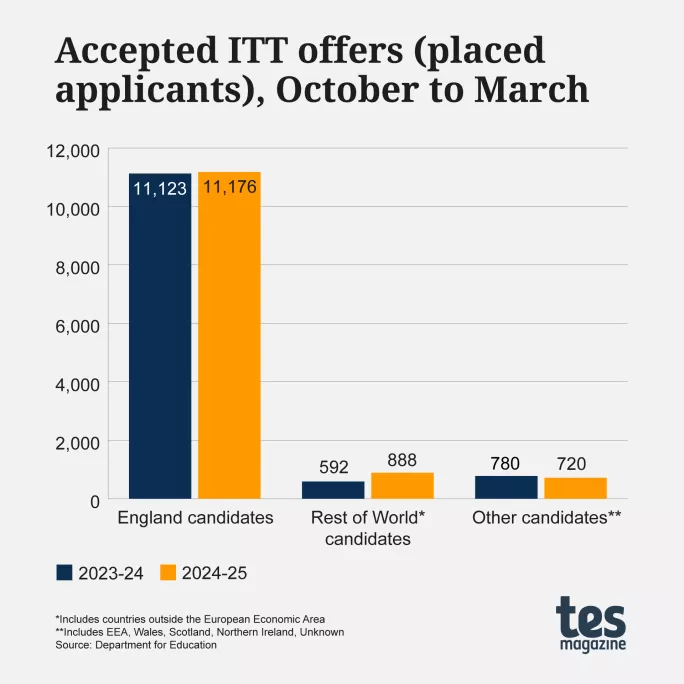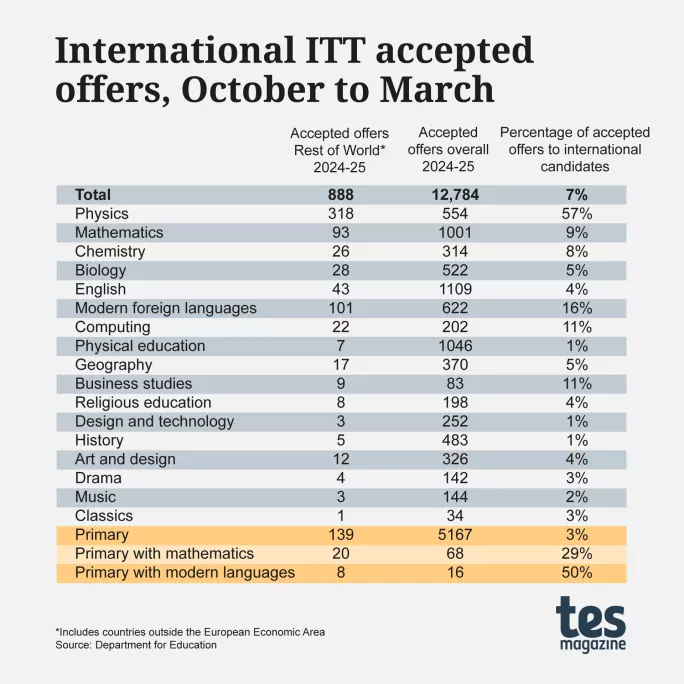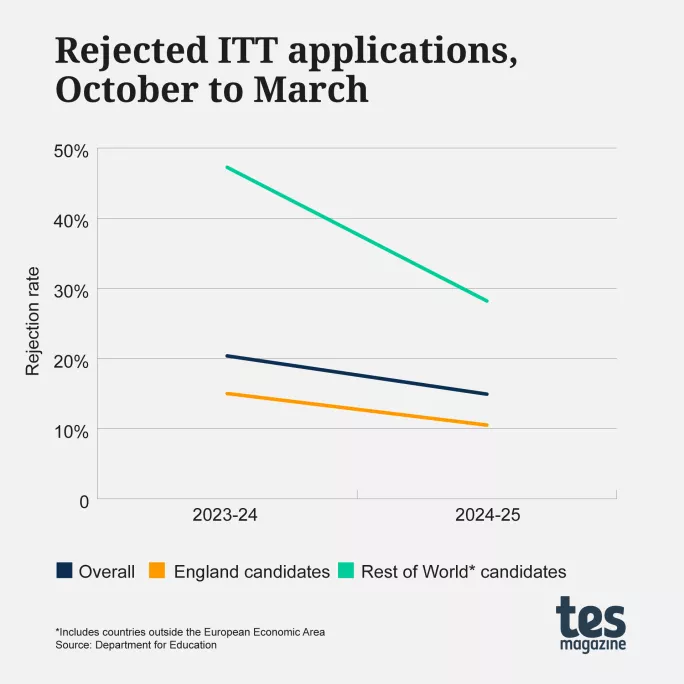Over 1 in 4 teacher trainee applicants are from overseas

More than a quarter of candidates applying to initial teacher training (ITT) courses starting next year are from overseas, Tes analysis reveals.
Since last October, 7,486 international candidates have submitted one or more applications to an ITT course - up by 82 per cent compared with the same period last year.
International candidates account for 26 per cent of all submissions between October 2023 and March 2024 - up from 17 per cent at the same point last year, latest Department for Education data shows.
And, while the numbers are relatively small, 50 per cent more international candidates have been accepted onto ITT courses for next year so far, rising from 592 to 888.

The figures, which cover countries outside the European Economic Area, come amid increasing government interest in boosting recruitment from abroad, as first revealed by Tes in January, against the backdrop of a spiralling recruitment crisis.
The Tes analysis also comes as one expert warned that the government’s focus on boosting international recruitment isn’t a “sustainable way to deal with ongoing teacher shortages” in the long term.
ITT providers have also called on the DfE for help with the “burden” that such applications create, including encouraging applicants to check the “equivalency” of their existing qualifications.
Most placed physics candidates are international
Some 554 physics candidates have been accepted onto an ITT course so far this cycle, up from 238 last year.
And 57 per cent of those candidates come from overseas, with 318 international candidates “placed” on courses so far this year.
- Background: 300% rise in teacher training applicants from overseas
- Exclusive: DfE mulls boost to international recruitment
- Recruitment crisis: DfE funds international market probe
Overall, there has been a 351 per cent rise in applications submitted to physics ITT courses from international candidates this year, rising from 561 last year to 2,579 this year.
Last year, physics recruited less than one-fifth of the target number of trainees for the second time.
And, despite the boost in candidates, the subject is predicted to miss its target by 74 per cent this year.
It is far from the only subject facing difficulties: last week, the National Foundation for Educational Research predicted that the government is “at risk of under-recruiting” secondary trainee teachers for 10 out of 17 subjects for next year, including modern foreign languages (MFL).

Since October, there have been 523 international applicants to MFL ITT courses - up by 204 per cent on the same period last year.
Of those, 101 have been accepted onto courses, with international recruits making up 16 per cent of the cohort so far.
The spike in interest comes after the government said it would offer non-UK trainees and teachers of languages and physics £10,000 to relocate to England as part of a new pilot scheme starting in autumn 2023.
Tes asked the DfE at the beginning of this year how many non-UK trainees and teachers of languages and physics had opted into the relocation pilot scheme so far.
However, the department said it would not publish the information as the details of the scheme were due to be published “alongside a research report into the department’s international teacher recruitment initiatives”.

Other subjects have seen a similar soaring interest from international candidates - but this is not always translating into high acceptance rates.
PE has seen a 322 per cent rise in international applications, soaring from 113 to 477 year-on-year. However, of this number, just seven candidates from overseas have been placed on courses.
Some 138 per cent more international ITT candidates have applied to chemistry courses this cycle, increasing from 366 to 872 - and just 26 of those have been accepted.
In RE, 200 international candidates have applied to ITT courses, with just eight accepted onto courses so far this year.
Sector ‘being pushed down same route as NHS’
Former DfE adviser Sam Freedman said that it was clear the school system “is being pushed down the same route as the NHS, with international recruitment being used to manage falling salaries and inadequate supply”.
He added that this was “not a sustainable way to deal with ongoing teacher shortages” in the long term.
Geoff Barton, general secretary of the Association of School and College Leaders, previously said that recruiting teachers from countries that need them doesn’t “morally...feel like the right thing for us to be doing”.
In the short term, Mr Freedman said the DfE and schools “need to consider the different ways they will need to support teachers who have experienced different curricula and educational approaches”.
‘Huge’ pressure
In November last year, providers warned that “the majority” of international applicants are not recruited, and the rise in applications was “placing unsustainable pressures” on training providers.
While the DfE has introduced measures to reduce this administrative burden - such as asking candidates to indicate if they need a visa sponsor to direct them to the right providers - some feel the government could go further.
James Noble-Rogers, executive director of the Universities Council for the Education of Teachers, said that the volume of international applicants continues to place “huge pressure on university ITT providers”.
He said that the DfE “could do more” to ease the burden on providers, “for example, in encouraging applicants (or even requiring them) to check the equivalency of their qualifications before applying and suggesting that those who already hold teaching qualifications to look at non-ITT options”.
Mr Noble-Rogers added that the increase in international recruits was due to messaging about teacher shortages in England and the economic circumstances in some countries.
Emma Hollis, CEO of the National Association of School-Based Teacher Trainers, said it was understandable that the DfE is “trying different routes to teacher recruitment”.
Ms Hollis agreed with Mr Noble-Rogers that there is still an “administrative burden”, but added that “the positive side is that a proportion of those applications are leading to offers and acceptances so we are seeing a net gain in accepted offers as a result of the increased interest from overseas”.
International applicants likely to be successful
While international applications are on the rise, just 7 per cent of placed candidates so far this year are international, up from 5 per cent last year.
Applications from international candidates so far this academic year have a 12 per cent success rate, with 888 candidates accepted out of the 7,486 that applied.
This is far lower than the 44 per cent success rate overall.
And looking at the overall rejection rate against total applications submitted, this has fallen to 14.91 per cent this year, down from 20.4 per cent last year.
However, the rejection rate for international applicants is much higher.
Some 28 per cent of international candidates have so far been rejected from ITT courses beginning in 2024-25, compared with 10.5 per cent of candidates from England.

However, the rejection rate has fallen overall year-on-year.
Almost half - 47 per cent - of international candidates applying for ITT courses up to March last year were rejected, compared with a fifth (20 per cent) overall.
A DfE spokesperson said that the department is “focused on striking the right balance between acting decisively to tackle net migration, which we are clear is far too high, and retaining and developing highly skilled teachers”.
For the latest education news and analysis delivered directly to your inbox every weekday morning, sign up to the Tes Daily newsletter
Keep reading for just £1 per month
You've reached your limit of free articles this month. Subscribe for £1 per month for three months and get:
- Unlimited access to all Tes magazine content
- Exclusive subscriber-only stories
- Award-winning email newsletters
topics in this article



